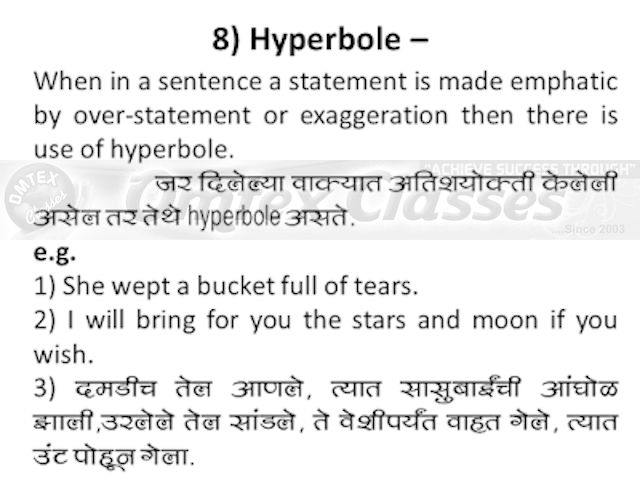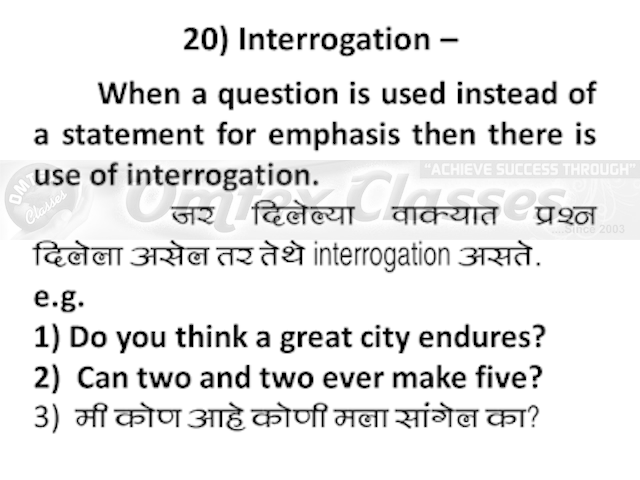Figure of Speech
1. Personification – human quality
Examples.
The Moon is laughing.
Personification: The Moon is given the human quality of Laughing.
The river is running.
Personification: The river is given the human quality of running.
The waves are dancing
Personification: The waves are given human quality of dancing.
Wind made the trees to dance.
Personification: The trees are given the human quality of dancing.
The pine trees frowned at the sun.
Personification: The pine trees are given the human action of ‘frowning’ (disappointing) .
The sky rejoices in the morning’s birth.
Dual Personification: Bothe the sky and the morning are given human abilities of ‘rejoicing’ and ‘being born’. respectively.
The forests are dying.
Personification: The forest is given the human ability of ‘dying’.
Wildlife is crying. (Try yourself)
Mother earth is sighing. (Try yourself)
And let us greet our Motherland and bow before her feet and say.
Personification: The Motherland is given human ability of ‘having feet’ and we are bowing. It is an act of human being.
2. Alliteration – repetition of same alphabet
It clogs and clutters up the mind.
Alliteration: The sound of the letter ‘c’ is repeated for poetic effect.
Such wondrous fine fantastic tales.
Alliteration: The sound of the letter ‘f’ is repeated for poetic effect.
And pirates wearing purple pants.
Alliteration: The sound of the letter ‘p’ is repeated for poetic effect.
The rain came heavily and fell in floods.
Alliteration: The sound of the letter ‘f’ repeated for poetic effect.
The hare is running races in her mirth.
Alliteration: The letter ‘r’ is repeated for poetic effect.
It’s sharing sorrow and work and mirth. (Try yourself)
It’s struggling on with the will to win.
And greedy industries play their polluted pranks.
The soup’s too hot, the corn’s too cold.
The tiptoe softly to the doorI wish I’d stayed a minute more.
Alliteration: The sounds of the letters ‘s’ and ‘m’ are repeated for poetic effect.
Mother! your millions meet and swear on this, our proud Republic Day. (Try yourself)
The grinning mask of death and doom worn by cress enemies of truth. (Try yourself)
Famine and drought and dread and doom. (Try yourself)
Let India’s millions chant in chorus. (Try yourself)
Down with all ruthless tyranny, down with all exploitation which Renders the poor: the poorer - and renders the bloated rich, more rich!
Alliteration: The sounds of the letter ‘p’ and ‘r’ are repeated for poetic effect.
3. Repetition – repetition of same word
They sit and stare and stare and sit.
Repetition: The words ‘sit’ and ‘stare’ are repeated pleasantly for poetic effect.
They ...used...to...read! They read and read, and read and read, and then proceed. (Try yourself)
So, please, oh please, we beg, we pray. (Try yourself)
4. Tautology – same meaning
Pure unadulterated butter available here.
Tautology: The meaning of the word ‘unadulterated’ is already contained in the word ‘pure’.
5. Antithesis – opposite words or ideas
Speech is silvern, but silence is golden.
Antithesis: Two opposite ideas of speech and silence are placed together for poetic effect.
6. Hyperbole – overstatement
And stare until their eyes pop out.
Hyperbole: The idea expressed is highly exaggerated.
It makes a child so dull and blind.
Hyperbole: The idea expressed is highly exaggerated.
His powers of thinking rust and freeze.
Hyperbole: The idea expressed is highly exaggerated.
For buying hundreds of electronic gadgets.
Hyperbole: The idea expressed is highly exaggerated.
Millions of fish are dying
Hyperbole: The idea expressed is highly exaggerated.
7. Interrogation – questions
How could anyone not know?
Interrogation: Idea is expressed in the form of a question.
8. Exclamation – expression
Oh! How wonderful is the rain.
Exclamation: The idea is conveyed explicitly.
Oh the value of the elderly!
Exclamation: The idea is conveyed explicitly.
9. Onomatopoeia – sound
The clock is running tik - tik - tik.
Onomatopoeia: Sense of sound is conveyed through the word ‘tik - tik - tik’
There was a roaring in the wind all night.
Onomatopoeia: Sense of sound is conveyed through the word ‘roaring’.
Jay makes an answer as the Magpie chatters.
Onomatopoeia: Sense of sound is conveyed through the word ‘chatters’
For something in it crunches.
Onomatopoeia: Sense of sound is conveyed through the word ‘crunches’.
Echoing and re - echoing a new hope and a new desire.
Onomatopoeia: Sense of sound is conveyed through the words ‘echoing’ and ‘re-echoing’
10. Climax - Ideas are arranged in the order of increasing importance.
The spectators smiled, giggled and finally burst into laughter.
Climax: Ideas are arranged in the order of increasing importance.
They’ll loll and slop and lounge about And stare until their eyes pop out.
Climax: Ideas are arranged in the order of increasing importance.
That nauseating, foul, unclean, Repulsive television screen!
Climax: Ideas are arranged in the order of increasing importance.
I’d tuck you in all safe at night. And hear your prayers, turn off the lights.
Climax: Ideas are arranged in the order of increasing importance.
11. Metaphor- An implicit (indirect) comparison is made without using words such as ‘like’, ‘as’ and ‘so’.
Before this monster was invented?
Metaphor: The television is indirectly compared to a monster.
Our world is an institution.
Metaphor: The world is indirectly compared to an institution.
They hold so many keys.
Metaphor: The experience of the elderly is indirectly compared to keys.
As a nation we are mission our greatest true resource.
Metaphor: The nation is indirectly compared to a resource
12. Simile - An explicit comparison is made between two things by using words such as ‘like’, ‘as’ and ‘so’
I wandered lonely as a cloud.
Simile: The loneliness of the poet is compared to that of the cloud using the word ‘as’.
His brain becomes as soft as cheese.
Smile: The softness of the brain is directly compared to that of cheese.
That attracts the industries to produce like maggots.
Simile: The industries are directly compared to maggots.
13. Apostrophe: Inanimate things are directly addressed.
O Mother! teach our hands to bear.
Apostrophe: The earth is directly addressed as if it were a living being.
Republic Day of India! Your dawning shall begin to work.
Apostrophe: Republic day is directly addressed as it were a living being.
14. Synecdoche - Here one idea is understood by means of another.
My hands were busy through the day.
Synecdoche: Part (hands) for the whole (the person).
My hands once busy now are still.
Synecdoche: Part (hands) for the whole (the person).























